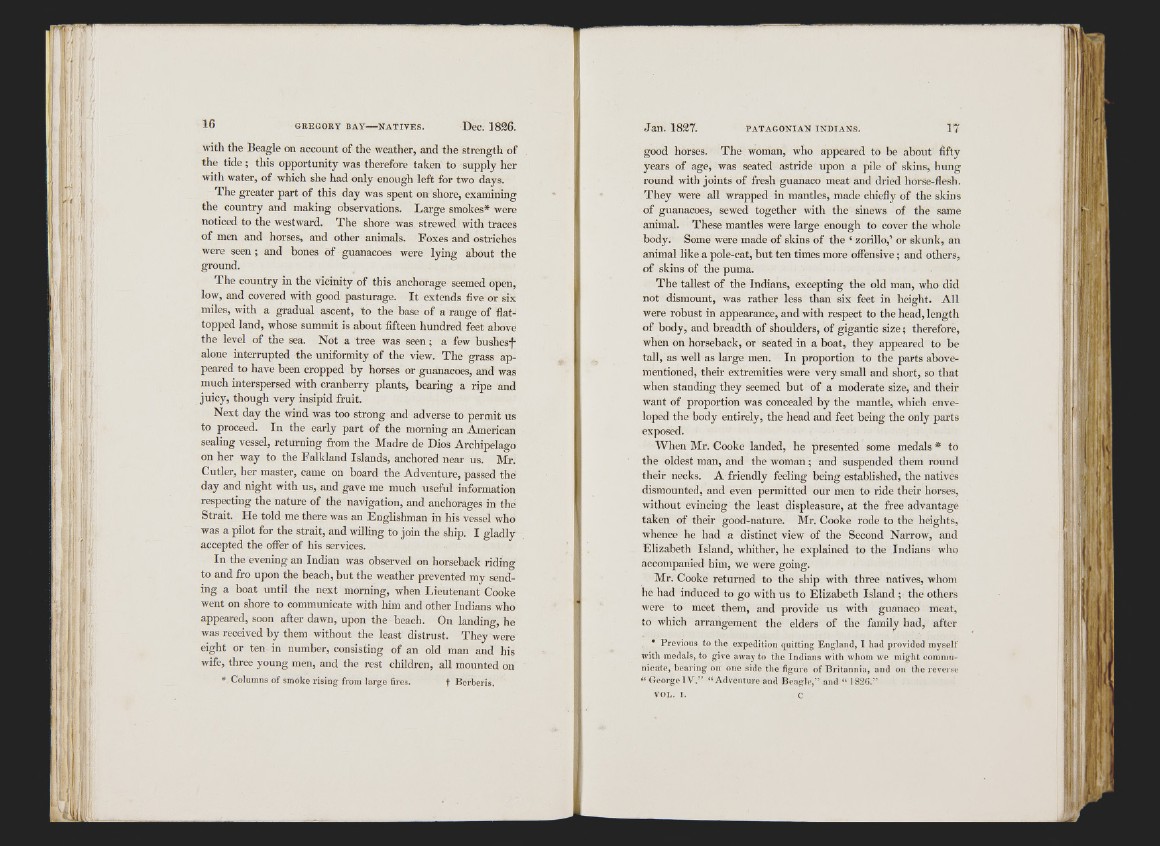
I
U|!i ttl •
ii'
with the Beagle on account of the weather, and the strength of
the tide; this opportunity was therefore taken to supply her
with water, of which she had only enough left for two days.
The greater part of this day was spent on shore, examining
the country and making observations. Large smokes* were
noticed to the westward. The shore was strewed with traces
of men and horses, and other animals. Foxes and ostriches
were seen; and bones of guanacoes were lying about the
ground.
The country in the vicinity of this anchorage seemed open,
low, and covered with good pasturage. It extends five or six
miles, with a gradual ascent, to the base of a range of flat-
topped land, whose summit is about fifteen hundred feet above
the level of the sea. Not a tree was seen; a few bushesf
alone interrupted the uniformity of the view. The grass appeared
to have been cropped by horses or guanacoes, and was
much interspersed with cranberry plants, bearing a ripe and
juicy, though very insipid fruit.
Next day the wind was too strong and adverse to permit us
to proceed. In the early part of the morning an American
sealing vessel, returning from the Madre de Dios Archipelago
on her way to the Falkland Islands, anchored near us. Mr.
Cutler, her master, came on board the Adventure, passed the
day and night with us, and gave me much useful information
respecting the nature of the navigation, and anchorages in the
Strait. He told me there was an Fnglishman in his vessel who
was a pilot for the strait, and willing to join the ship. I gladly
accepted the offer of his services.
In the evening an Indian was observed on horseback riding
to and fro upon the beach, but the weather prevented my sending
a boat until the next morning, when Lieutenant Cooke
went on shore to communicate with him and other Indians who
appeared, soon after dawn, upon the beach. On landing, he
was received by them without the least distrust. They were
eight or ten in number, consisting of an old man and his
wife, three young men, and the rest children, all mounted on
• Columns of smoke rising; from large fires. f Berberis.
good horses. The woman, who appeared to be about fifty
years of age, was seated astride upon a pile of skins, hung
round with joints of fresh guanaco meat and dried horse-flesh.
They were all wrapped in mantles, made chiefly of the skins
of guanacoes, sewed together with the sinews of the same
animal. These mantles were large enough to cover the whole
body. Some were made of skins of the ‘ zorillo,’ or skunk, an
animal like a pole-cat, but ten times more offensive; and others,
of skins of the puma.
The tallest of the Indians, excepting the old man, who did
not dismount, was rather less than six feet in height. A ll
were robust in appearance, and with respect to the head, length
of body, and breadth of shoulders, of gigantic size; therefore,
when on horseback, or seated in a boat, they appeared to be
tall, as well as large men. In proportion to the parts above-
mentioned, their extremities were very small and short, so that
when standing they seemed but of a moderate size, and their
want of proportion was concealed by the mantle, which enveloped
the body entirely, the head and feet being the only parts
exposed.
When Mr. Cooke landed, he presented some medals * to
tlie oldest man, and the woman; and suspended them round
their necks. A friendly feeling being established, the natives
dismounted, and even permitted our men to ride their horses,
without evincing the least displeasure, at the free advantage
taken of their good-nature. Mr. Cooke rode to the heights,
whence he had a distinct view of the Second Narrow, and
Flizabeth Island, whither, he explained to the Indians who
accompanied him, we were going.
Mr. Cooke returned to the ship with three natives, whom
he had induced to go with us to Elizabeth Island ; the others
were to meet them, and provide us with guanaco meat,
to which arrangement the elders of the family had, after
• Previous to the expedition quitting; England, I had provided myself
with medals, to give away to the Indians with whom we might communicate,
bearing on one side the figure of Britannia, and on the revei se
“ G e o rg e IV .” “ Adventure and Beagle,” and “ I82C.”
VOL. I. c
I b